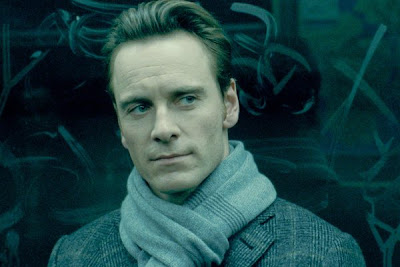 It's been a little slow on the movie front lately, what with the hoops tourney and it becoming all summery practically overnight, but since I had to work Saturday morning and couldn't partake in the the all-day St. Patty's day destroy yourself-athon, I decided to take it easy on Friday night and dropped into the State Theater to soak in another of the most talked-about films of 2011.
It's been a little slow on the movie front lately, what with the hoops tourney and it becoming all summery practically overnight, but since I had to work Saturday morning and couldn't partake in the the all-day St. Patty's day destroy yourself-athon, I decided to take it easy on Friday night and dropped into the State Theater to soak in another of the most talked-about films of 2011.
It’s impossible to review a film as brazen as Shame without #smh at the bias built into the MPAA rating system. If you haven’t yet, I highly recommend checking out the documentary This Film is Not Yet Rated for a better understanding of the unseen machinations behind what audiences are allowed/directed to see, and especially as a call to action for those who prefer art to be an unfiltered product of artists, not corporate interests. Shame is a reminder of how American culture glamorizes violence but pushes sex into closets, and even though the film is set in New York, it takes a European film headed by a German (Michael Fassbender as the oversexed-yet-deeply-repressed Irish-Catholic Brandon Sullivan) and two Brits (Carey Mulligan as Brandon’s sister, Sissy, and director Steve McQueen) to drive this issue home once again.
An NC-17 rating is like an automatic blackballing and only the artiest of art theaters will show films that have been slapped with one, though sometimes the buzz surrounding it will give it more of a box office push than it might have had otherwise. It's odd when you to compare the content of Shame to another 2011 film, The Girl With the Dragon Tattoo, which I’m sure shocked many but it must have taken hold in many minds as well, given the box office and critical success. Fincher has established edgy cred in the industry with Fight Club, Seven, Zodiac, and managed to garner an R rating despite instances of rape and deviant sexuality, and a flash or two of female frontal nudity. It can’t hurt that Stieg Larsson’s series was a bestselling juggernaut and there was a lot of money on the line. On the other hand, Shame is a bit fleshy, but is miles away from broaching porno territory. All of us have seen one or the other and hopefully both, so why should it illicit shock to see flaccid male frontal blown up on the the big screen? #NoHomo, but get over it already America.
This is a little bit hilarious to me, because Shame is a big middle finger to the whole idea of censorship. The thematic focus is on Brandon’s struggle with his sexual addiction, but he can only act on his constant urges either through masturbation or sex with total strangers. As soon as he connects with someone face-to-face he cannot bring himself to follow through with the act, and he goes to sometimes shocking ends to fulfill that need. The surprise lies not at the ambiguous ending, but in the whole usurping of this expectation of a film about a sex addict. We see plenty of nudity and animalistic urges, but they are turned on their head and are not “sex scenes” and are surprisingly not as explicit as I thought they would be. They are set pieces, not meant to titillate but to shape and define the character and his descent into an intense mental breakdown, and to a lesser extent to set up the oncoming dramatic twist. The fact that there is some flesh in your face is secondary to what is going on in his mind, and we worry about what might be going on offscreen while all of this is happening.
The outstanding soundtrack and haunting score carry things along, and there are shades of American Psycho in the delivery, although the underlying social commentary is more focused and not nearly as humorous or biting. There are a few minuses: some character things are completely hidden from the audience for far too long, or completely unexplained even by the end. The past between Brandon and Sissy is palpable, hinted at, but never fully developed, and some of the scenes stretch long long long past the point of a standard western comfort zone, something I can appreciate but I fear most will find distractingly boring. Case in point is the “New York New York” torch scene, which is an agonizingly frozen moment in time, with no camera movement and only a couple of cuts through its lengthy performance. It fuels the theme of stagnant loneliness that pervades the lives of Brandon and Sissy, and this works as a stark counterpoint to the lyrics of the song, so typically belted out in a hopeful, upbeat blaze of bravado.
This also contrasts the snappy, wordless opening jumping quickly from encounter to encounter as we learn most of what we need to know about Brandon within a few short beats. In my opinion, the opening also contains the most erotic scene of the entire film, which exists completely between the eyes of Brandon and an anonymous woman on the subway. We can read their minds as they trade glances and eventually passionate gazes, and it’s a potent reminder that the most sensitive sexual organ is the brain, the greatest erogenous zone is the imagination.




No comments:
Post a Comment